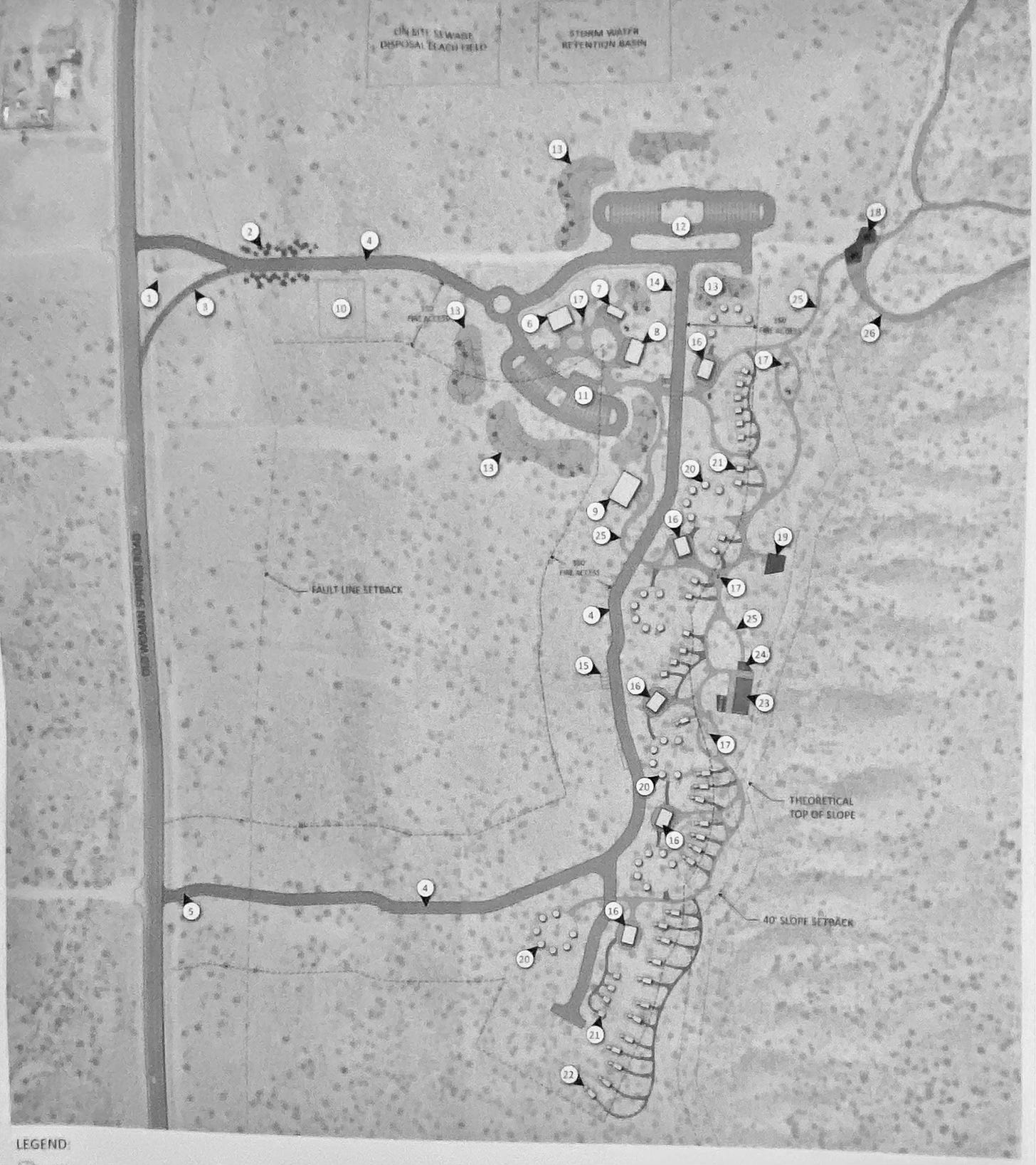FLAMINGO 640 DEVELOPER READIES APPEAL OF CONDITIONAL USE PERMIT DENIAL
RoBott developer working on the incredible shrinking glamping resort

By Laura Hauther
Desert Trumpet continues to monitor the Flamingo 640 glamping development. DT staff feel this reporting is crucial given the potential for similar resorts in rural living zoning in Twentynine Palms. DT Editor Cindy Bernard recently learned that a 151-acre parcel bordered by Highway 62 and Sullivan located in Indian Cove is in escrow to “Yonder” — which we believe is associated with Yonder Corporation and Yonder Hospitality, a company that HAS developed resorts nationwide, for example, in Escalante, UT, with vintage Airstreams and an outdoor movie theater.
We have also submitted a Public Information Request seeking updates on the adjacent 218-acre parcel, bordered by Sullivan and Joshua Tree National Park, whose owner submitted a resort development pre-application last year.
Meanwhile, the Stop Wonder Inn campaign is monitoring the appeal by developers to the San Bernardino County Supervisors and is ready to mobilize as soon as the appeal is scheduled.
FLAMINGO HEIGHTS – Residents of Flamingo Heights and Landers met at the Flamingo Heights community center at the end of August to get updates on the ongoing battle against the Flamingo 640 glamping resort. The San Bernardino Planning Commission failed to vote on the project last March, as reported in “Wonder Valley and Morongo Basin Push Back Against Big Glamp.”
That move effectively denied the conditional use permit (CUP) for developers RoBott Land Company without prejudice, allowing the company to appeal the denial at a later date. The company is making major changes to the project, but so far no date for the appeal has been set.
The meeting, led by activists Justin Merino from SaveOurDeserts.org, Chris Clarke, Associate Director of the California Desert Program of the National Parks Conservation Association, and Caroline Partamian of the Glamping Taskforce, was held to update the community on the developer’s latest strategy to get the CUP they need to move ahead with their project.
RoBott seems to be delaying that appeal hearing to redesign the massive resort in hopes of tamping down the objections of residents in the area. They’re fighting an uphill battle—during the CUP hearing, every public comment from the community was against approval, including those in two binders filled with almost 3,000 comments.
The list of modifications in their letter of appeal removes some of the most problematic aspects of the project. Gone are the helipad, massive firepits and one of the two 3,600 sq foot workshops and 5,500 sq foot art barns. The size of the restaurant and the bar are about half what had originally been proposed.
While these seemed to be welcomed changes to the project, they don’t address the key issues driving the objections—protecting wildlife and the environment, traffic, noise and light pollution, and cutting down or moving Joshua Trees.
This battle stems from the county’s rural living zoning ordinance, which allows for commercial and industrial use without specifying boundaries for those projects and residential areas.
A clip was played of Supervisor Dawn Rowe discussing the rural living zone laws on local station 107.7. Rowe agreed that the current RL zoning laws don’t do enough to protect the community.
“We’re stuck with a 50-year-old law”, Rowe said, “created when the area was very sparsely populated,” but when asked about solar farm projects, Rowe said those are no longer permitted after the BOS voted to ban them in rural living zones in 2019.
Merino pointed out that the change in solar farm regulation “…means we are not stuck with that 50-year-old law; when STRs came out, the county was quick to pass laws and legislation…and that took them only a couple months.”
The Board of Supervisors has not responded to a formal request to review the rural living regulations, but that could be an important next step. Until a date is set with either the planning commission or the Board of Supervisors, taking pictures of wildlife to submit to the California Natural Diversity database run by the California Department of Fish and Wildlife will help prove the area around the project site is important to local fauna.
Chris Clarke encouraged getting comments ready to submit when the appeal date is posted, encouraging both impassioned pleas and substantive arguments.
“We’d like to have one of those [emotional pleas] for every three nuts and bolts comments because elected officials want to know what their constituents think.”
Clark said pushing back against big projects like this can take four or five years before they’re gone for good.
For updates and more information visit SaveOurDeserts.org
Share your thoughts in the comments below or in our live chat in the Substack app. Please note that we do not allow anonymous comments. Please be sure your name is on your profile prior to commenting. Anonymous comments will be deleted.

